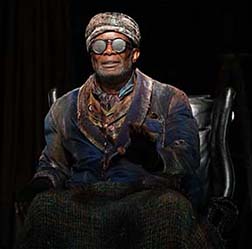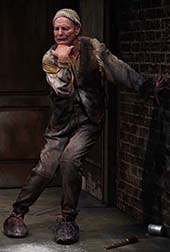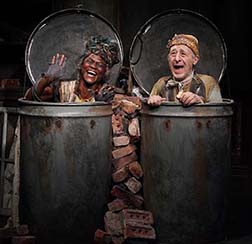
Lucy Komisar
|
Irish Rep’s “Endgame” is brilliant take on Beckett’s vision at the world’s end. “Endgame”
Samuel Beckett’s surreal vision of dueling human nastiness and compassion, misery and hope takes place in a nondescript walled space. Outside the world has ended, but somehow these people have survived the apocalypse. The Irish Repertory Theatre production, powerfully directed by Ciarán O’Reilly, envelopes you in a bleak mood conveyed by the gloomy dialogue as well as the dark red bricks. Hamm (the incomparable John Douglas Thompson), literally the central
figure, is ensconced in a leather arm chair on a platform with castors.
(Set by Charlie Corcoran.) He is blind, abusive, arrogant. Thompson
explodes with his fury. But if Hamm has no sight, he has sharpened
his ability to sense, maneuver, manipulate. He dominates, in control.
Clov (the masterful clown Bill Irwin) is his abused servant. They are opposites. Hamm says I can’t stand. Clov: I can’t sit. Clov’s mobility is challenged as he limps on legs that don’t work right. His body twists, bends like a rag doll. When he repeatedly climbs a ladder to follow Hamm’s instructions to look out a window, he pulls one leg over the top so his thigh perches on it. It’s a shtick you wait for. Irwin sometimes just breathes his words, or he emits silent screams. But he follows orders. Why does Irwin accept the abuse? Hamm plays on his having taken Clov in as a child: “I was a father to you. …My house a home for you. …But for me, no father. But for Hamm, no home.” Clov agrees, but says, “I’ll leave you…I can’t go very far… I’ll leave you.” Hamm is anything but fatherly. He screams at Clov and berates him. Nagg (Joe Grifisi) Hamm’s father and Nell (Patrice Johnson Chevannes) his mother don’t have legs at all, the result of an accident. They inhabit battered garbage cans set off to one side. They show affection to each other: Chevannes radiates, Nagg is kindly. But their son is contemptuous of them, doesn’t take care of them.
Nagg is freezing, says: “Do you want to go in?” Nell replies yes, but doesn’t move. He asks, “Has he changed your sawdust?” Nell: “It isn’t sawdust.” He replies: “Your sand then. It’s not important.” She says it is. Hamm tells stories which may or may not be about his life. You get a sense of inner anger, but that is expressed by his manipulation. Sometimes his expression is calm, but that’s a false calm. The only thing that he can touch, that touches him is the stuffed dog he grabs. Neither the parents nor Clov can end their cruel dependency on Hamm. Hamm taunts Clov, “Why do you stay with me?” and “Why don’t you kill me?” Later Clov says, “If I could kill him, I’d die happy.”
"Is there a future? Clov says, “Something is taking its course.” Hamm: “We’re not beginning to… to… mean something?” Clov: “You and I, mean something! Ah that’s a good one. “ Hamm wonders, “Imagine if a rational being came back to earth, wouldn’t he be liable to get ideas into his head if he observed us long enough. Ah, good, now I see what it is, yes, now I understand what they’re at!…To think perhaps it won’t all have been for nothing!” When Clov scratches a flee, Hamm declares, “But humanity might start from there all over again! Catch him, for the love of God!” Then later pessimism again. Hamm rebukes him, “One day you’ll be blind like me. You’ll be sitting there, a speck in the void, in the dark, forever, like me.” And still later Hamm asks him, “Did you ever have an instant of happiness?” Clov replies, “Not to my knowledge.” On the cusp of annihilation, a glimmer of hope disappears into a void of misery. Beckett wrote the play in French as “Fin de partie,” and it was first performed in 1957 at the Royal Court in London. In the fifties, with the Cold War heating up fear of nuclear weapons. Beckett makes as much sense today as he did then.
Visit Lucy’s website http://thekomisarscoop.com/ |
| museums | NYTW mail | recordings | coupons | publications | classified |




